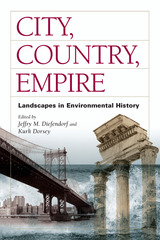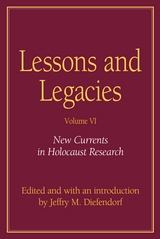
In the urgently expanding field of environmental history, two trends are emerging. Research has internationalized, crossing political and historical borders. And urban spaces are increasingly seen as part of, not apart from, the global environment. In this book, Jeffry Diefendorf and Kurk Dorsey have gathered much of the important work pushing the field in new directions. Eleven essays by prominent and regionally diverse scholars address how human and natural forces collaborate in the creation of cities, the countryside, and empires.
The Cities section features essays that examine pollution and its aftermath in Pittsburgh, the Ruhr Valley (Germany), and Los Angeles. These urban areas are far apart on the globe but closely linked in their histories of how human decision making has affected the environment.
Changing rural and suburban spaces are the focus of Countryside. Elizabeth Blackmar "follows the money" in order to understand why the financing of suburban mall developments makes local resistance difficult. Studies of the fractious history of the creation of a wildlife refuge in Oregon and the ongoing impact of hydraulic mining in the early California goldmining era emphasize the misuse of technology in rural spaces.
Such misuse is a central idea of Empires. In "When Stalin Learned to Fish," Paul R. Josephson tells the story of Soviet fishing technology designed to "harness fish to the engine of socialism." Other essays explore the failures of Western agricultural technology in Africa and the relationship between such technology and disease in European attempts to conquer the Caribbean. In a stirring, wide-ranging consideration of the neo-European colonies (the United States, Australia, Canada, and New Zealand), Thomas R. Dunlap observes the ongoing, unsettled interaction of lands and dreams. An afterword by Alfred W. Crosby, an eminent scholar of environmental history, closes the book with a broad and insightful synthesis of the history and future of this critical field.

Several of the essays-such as one on nonarmed "amidah" or resistance and others on the role of gender in the behavior of perpetrators and victims-provide innovative and potentially significant interpretive frameworks for the field of Holocaust studies. Others; for instance, the rounding up of Jews in Italy, Nazi food policy in Eastern Europe, and Nazi anti-Jewish scholarship, emphasize the importance of new sources for reconstructing the historical record. Still others, including essays on the 1964 Frankfurt trial of Auschwitz guards and on the response of the Catholic Church to the question of German guilt, bring a new depth and sophistication to highly charged, sharply politicized topics. Together these essays will inform the future of the Holocaust in scholarly research and in popular understanding.
READERS
Browse our collection.
PUBLISHERS
See BiblioVault's publisher services.
STUDENT SERVICES
Files for college accessibility offices.
UChicago Accessibility Resources
home | accessibility | search | about | contact us
BiblioVault ® 2001 - 2024
The University of Chicago Press









